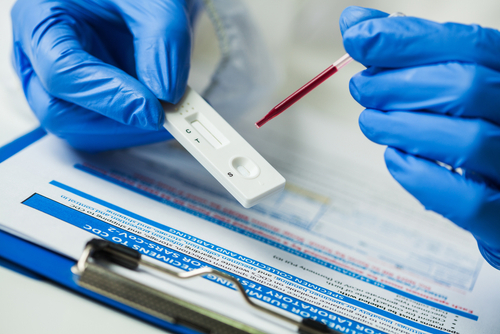
Researchers with the U.S. Army Futures Command are developing alternative ways to measure COVID-19 antibody levels that are faster, easier, and less expensive.
Their work revolves around finding alternatives to measuring virus neutralization, or VN, titers. This process is the gold standard of COVID-19 antibody testing, as VN antibodies in the blood have been shown to correlate with protective immunity levels. However, this antibody testing method is not widely available as it is technically complex and requires days to set up and run.
The research team — led by Jimmy Gollihar, biochemist and biotechnologist for the U.S. Army Combat Capabilities Development Command’s Army Research Laboratory at CCDC ARL South in Austin, Texas, and John Dye at the U.S. Army Medical Research Institute of Infectious Diseases, or USAMRIID — looked to develop another type of test, called enzyme-linked immunosorbent assays, or ELISAs. ELISAs are standard quantitative tests used to measure antibodies to a particular antigen in a given sample.
“ELISAs are standard assays that can be performed in almost any academic or medical laboratory,” Gollihar said. “This is important in emergency care centers treating critically ill patients. The assays can also be used for serological monitoring of the disease.”
The team found that the ELISA tests had an 80 percent or greater probability of predicting VN titers at or above the Food and Drug Administration-recommended levels for COVID-19 convalescent plasma.
“In all, we discovered that high titer ELISAs correlate well to virus neutralization and can be used as a surrogate for screening convalescent plasma,” Gollihar said.
The research team also includes partners from Houston Methodist, Pennsylvania State University, and the University of Texas at Austin,
Further, the researchers found that convalescent donors maintain high immunity levels over the course of many weeks and that frequent plasma donations did not cause a significant decrease in antibody or virus neutralization levels. In addition, they identified 27 individuals from the surveillance cohort with high enough antibody titers to indicate that some asymptomatic individuals may have plasma suitable for therapeutic use and may have a degree of relative immunity against SARS-CoV-2.
“This collaboration between the Army, Houston Methodist, and our partners in academia shows the incredible diversity of complementary capabilities we can deploy in responding to a worldwide pandemic,” Dye said.




